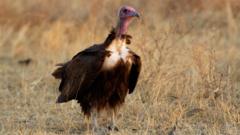Can Wales Save Endangered Vultures Through Breeding?

Published: 2025-08-25 21:05:04 | Category: wales
The Falconry Experience Wales in mid Wales is taking significant steps to save the critically endangered African hooded vultures from extinction through breeding efforts. With fewer than 150,000 of these vultures left in the wild, the centre aims to contribute to their survival and ecological balance.
Last updated: 25 October 2023 (BST)
Key Takeaways
- The African hooded vulture is critically endangered, with numbers declining rapidly.
- Breeding efforts at Falconry Experience Wales aim to bolster the population.
- Vultures play a crucial role in ecosystem health by cleaning up carcasses.
- Poisoning and traditional medicine practices threaten vulture populations.
- Conservationists stress the importance of maintaining a safety net population.
The Importance of Vultures in Ecosystems
Vultures, often overlooked and underappreciated, are vital to the health of ecosystems. Their role as scavengers helps control the spread of disease by consuming dead animals, preventing potential outbreaks that could affect other wildlife and even humans. For instance, in India, the decline of vultures has been linked to a rise in disease, resulting in an estimated half a million deaths over five years.
The Decline of Hooded Vultures
According to the International Union for Conservation of Nature (IUCN), hooded vultures are classified as critically endangered, with a 2021 assessment revealing that mature adult numbers had fallen to approximately 131,000. This decline is attributed to various factors, primarily poisoning and the illegal use of vulture parts in traditional medicine.
Luce Green, who runs Falconry Experience Wales alongside her partner Barry MacDonald, emphasises the urgency of the situation. "We are losing them at such rapid rates," she states, highlighting the need for immediate conservation efforts.
Breeding Efforts at Falconry Experience Wales
The Falconry Experience Wales centre has taken on the ambitious task of breeding hooded vultures. They have introduced a hand-reared male, Togo, to a female named Hope, with the hope of producing a chick. However, breeding is a slow process; typically, vultures only produce one chick at a time.
Ms Green explains, "There are only 200 hooded vultures in a human-based environment and the race is on. It's a fine line of what's needed to actually save them." The breeding programme aims not only to increase the population in captivity but also to prepare for future release efforts when environments are deemed safe.
Challenges in Vulture Conservation
Despite the promising efforts at Falconry Experience Wales, the road to recovery for hooded vultures is fraught with challenges. Poaching remains a significant threat, as poachers fear that vultures circling overhead will reveal their location. Additionally, traditional medicine practices continue to drive demand for vulture parts, further complicating conservation efforts.
The Role of Conservationists
Campbell Murn, head of conservation research and education at the Hawk Conservancy Trust, stresses the significance of breeding vultures to maintain a so-called "safety net population." He describes vultures as the "canary in the coal mine," indicating broader environmental health issues. "If your vultures are dying and disappearing, then you've really got some problems," he warns.
Conservationists like Adam Bloch and Holly Cale from The Horstmann Trust in Carmarthenshire are also crucial to this effort. They are involved in the European Endangered Species Programme for hooded vultures, supporting breeding initiatives across Europe. "We are the fall-back," Bloch notes, underscoring the collaborative nature of conservation efforts.
Innovative Approaches to Monitoring
Recently, Falconry Experience Wales acquired GPS trackers for four hooded vultures in West Africa. This initiative aims to monitor their movements for up to five years, providing valuable data that can inform conservation strategies. Additionally, the centre is raising funds for poison response kits to treat vultures affected by poisoning incidents.
Broader Implications for Vulture Conservation
While the focus is currently on hooded vultures, the conservation efforts at Falconry Experience Wales may also benefit other vulture species, such as the white-backed vulture, which is facing similar threats. With only around 270,000 white-backed vultures remaining globally, and just over 7,000 in South Africa, these birds are also in dire need of protection.
Ms Green points out the urgency: "Hooded vultures and white-backed vultures are currently the species most at risk." Their decline serves as a reminder of the interconnectedness of species within ecosystems and the ripple effects that can occur when one species disappears.
Public Awareness and Engagement
Raising awareness about vultures is essential for conservation. Many people view these birds negatively due to misconceptions about their role in nature. Education campaigns can help reframe vultures as crucial ecosystem engineers, fostering a sense of responsibility towards their protection.
Moreover, individuals can contribute to vulture conservation through various means, such as supporting wildlife charities, participating in local conservation efforts, or simply spreading the word about the importance of these often-misunderstood birds.
What Happens Next?
As Falconry Experience Wales continues its pioneering breeding programme, the future of hooded vultures remains uncertain. The centre acknowledges that while rearing even a small number of chicks in a safe environment is a step forward, more systemic changes are needed to address the threats vultures face in their natural habitats.
Conservationists are hopeful that collaborative efforts across organisations and countries will ultimately lead to a turnaround for hooded vultures and their kin. The goal is not only to prevent extinction but also to restore healthy populations that can thrive in the wild.
FAQs
Why are hooded vultures critically endangered?
Hooded vultures are critically endangered due to threats such as poisoning, poaching, and the illegal use of vulture parts in traditional medicine. Their population has declined significantly, with fewer than 150,000 remaining in the wild.
What role do vultures play in the ecosystem?
Vultures are essential scavengers that help clean up dead animals, preventing the spread of disease and maintaining ecological balance. Their decline can lead to significant public health issues, as seen in India.
How can individuals help in vulture conservation?
Individuals can support vulture conservation by donating to wildlife charities, participating in local conservation efforts, and raising awareness about the importance of vultures in ecosystems.
What is the breeding programme at Falconry Experience Wales?
Falconry Experience Wales has initiated a breeding programme for hooded vultures, aiming to increase their population in captivity. The centre has introduced a male and female pair, hoping to produce chicks that may eventually be part of a release programme.
What challenges do conservationists face in saving vultures?
Conservationists face numerous challenges, including habitat loss, poisoning, and illegal poaching. Public misconceptions about vultures also hinder conservation efforts, making education crucial for their survival.



